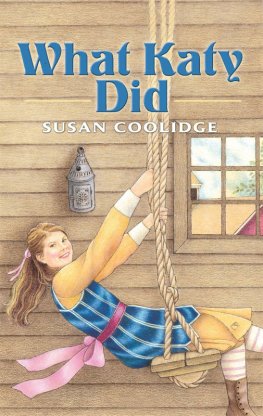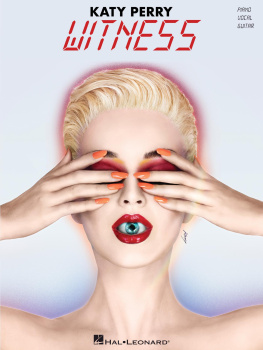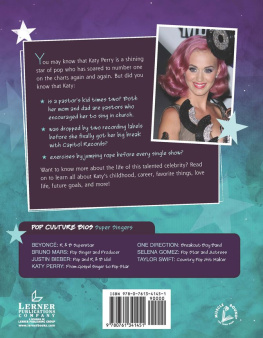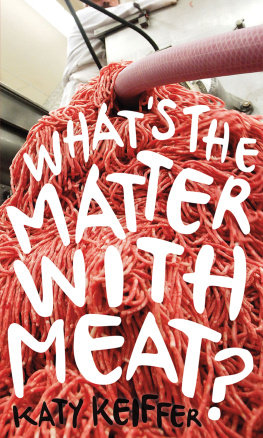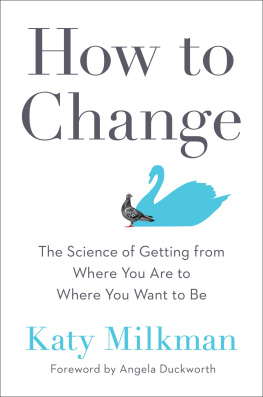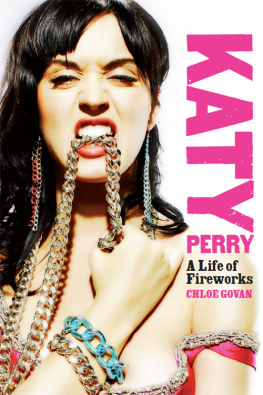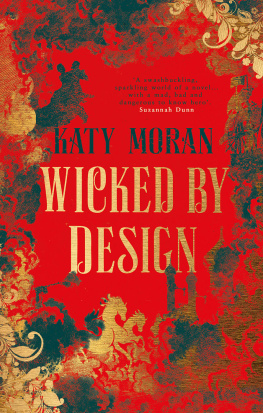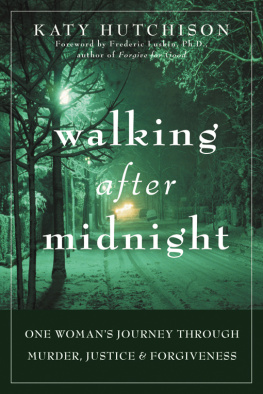Susan Coolidge - What Katy Did
Here you can read online Susan Coolidge - What Katy Did full text of the book (entire story) in english for free. Download pdf and epub, get meaning, cover and reviews about this ebook. genre: Prose. Description of the work, (preface) as well as reviews are available. Best literature library LitArk.com created for fans of good reading and offers a wide selection of genres:
Romance novel
Science fiction
Adventure
Detective
Science
History
Home and family
Prose
Art
Politics
Computer
Non-fiction
Religion
Business
Children
Humor
Choose a favorite category and find really read worthwhile books. Enjoy immersion in the world of imagination, feel the emotions of the characters or learn something new for yourself, make an fascinating discovery.
- Book:What Katy Did
- Author:
- Genre:
- Rating:3 / 5
- Favourites:Add to favourites
- Your mark:
- 60
- 1
- 2
- 3
- 4
- 5
What Katy Did: summary, description and annotation
We offer to read an annotation, description, summary or preface (depends on what the author of the book "What Katy Did" wrote himself). If you haven't found the necessary information about the book — write in the comments, we will try to find it.
What Katy Did — read online for free the complete book (whole text) full work
Below is the text of the book, divided by pages. System saving the place of the last page read, allows you to conveniently read the book "What Katy Did" online for free, without having to search again every time where you left off. Put a bookmark, and you can go to the page where you finished reading at any time.
Font size:
Interval:
Bookmark:
WHAT KATY DID
By
SUSAN COOLIDGE
TO FIVE.
Six of us once, my darlings, played together
Beneath green boughs, which faded long ago,
Made merry in the golden summer weather,
Pelted each other with new-fallen snow.
Did the sun always shine? I cant remember
A single cloud that dimmed the happy blue,
A single lightning-bolt or peal of thunder,
To daunt our bright, unfearing lives: can you?
We quarrelled often, but made peace as quickly,
Shed many tears, but laughed the while they fell,
Had our small woes, our childish bumps and bruises,
But Mother always kissed and made them well.
Is it long since?it seems a moment only:
Yet here we are in bonnets and tail-coats,
Grave men of business, members of committees,
Our play-time ended: even Baby votes!
And star-eyed children, in whose innocent faces
Kindles the gladness which was once our own,
Crowd round our knees, with sweet and coaxing voices,
Asking for stories of that old-time home.
Were you once little too? they say, astonished;
Did you too play? How funny! tell us how.
Almost we start, forgetful for a moment;
Almost we answer, We are little now!
Dear friend and lover, whom to-day we christen,
Forgive such brief bewilderment,thy true
And kindly hand we hold; we own thee fairest.
But ah! our yesterday was precious too.
So, darlings, take this little childish story,
In which some gleams of the old sunshine play,
And, as with careless hands you turn the pages,
Look back and smile, as here I smile to-day.
CHAPTER I
THE LITTLE CARRS
I was sitting in the meadows one day, not long ago, at a place where there was a small brook. It was a hot day. The sky was very blue, and white clouds, like great swans, went floating over it to and fro. Just opposite me was a clump of green rushes, with dark velvety spikes, and among them one single tall, red cardinal flower, which was bending over the brook as if to see its own beautiful face in the water. But the cardinal did not seem to be vain.
The picture was so pretty that I sat a long time enjoying it. Suddenly, close to me, two small voices began to talkor to sing, for I couldnt tell exactly which it was. One voice was shrill; the other, which was a little deeper, sounded very positive and cross. They were evidently disputing about something, for they said the same words over and over again. These were the wordsKaty did. Katy didnt. She did. She didnt. She did. She didnt. Did. Didnt. I think they must have repeated them at least a hundred times.
I got up from my seat to see if I could find the speakers; and sure enough, there on one of the cat-tail bulrushes, I spied two tiny pale-green creatures. Their eyes seemed to be weak, for they both wore black goggles. They had six legs apiece,two short ones, two not so short, and two very long. These last legs had joints like the springs to buggy-tops; and as I watched, they began walking up the rush, and then I saw that they moved exactly like an old-fashioned gig. In fact, if I hadnt been too big, I think I should have heard them creak as they went along. They didnt say anything so long as I was there, but the moment my back was turned they began to quarrel again, and in the same old wordsKaty did. Katy didnt. She did. She didnt.
As I walked home I fell to thinking about another Katy,a Katy I once knew, who planned to do a great many wonderful things, and in the end did none of them, but something quite different,something she didnt like at all at first, but which, on the whole, was a great deal better than any of the doings she had dreamed about. And as I thought, this little story grew in my head, and I resolved to write it down for you. I have done it; and, in memory of my two little friends on the bulrush, I give it their name. Here it isthe story of What Katy Did.
Katys name was Katy Carr. She lived in the town of Burnet, which wasnt a very big town, but was growing as fast as it knew how. The house she lived in stood on the edge of the town. It was a large square house, white, with green blinds, and had a porch in front, over which roses and clematis made a thick bower. Four tall locust trees shaded the gravel path which led to the front gate. On one side of the house was an orchard; on the other side were wood piles and barns, and an ice-house. Behind was a kitchen garden sloping to the south; and behind that a pasture with a brook in it, and butternut trees, and four cowstwo red ones, a yellow one with sharp horns tipped with tin, and a dear little white one named Daisy.
There were six of the Carr childrenfour girls and two boys. Katy, the oldest, was twelve years old; little Phil, the youngest, was four, and the rest fitted in between.
Dr. Carr, their Papa, was a dear, kind, busy man, who was away from home all day, and sometimes all night, too, taking care of sick people. The children hadnt any Mamma. She had died when Phil was a baby, four years before my story began. Katy could remember her pretty well; to the rest she was but a sad, sweet name, spoken on Sunday, and at prayer-times, or when Papa was especially gentle and solemn.
In place of this Mamma, whom they recollected so dimly, there was Aunt Izzie, Papas sister, who came to take care of them when Mamma went away on that long journey, from which, for so many months, the little ones kept hoping she might return. Aunt Izzie was a small woman, sharp-faced and thin, rather old-looking, and very neat and particular about everything. She meant to be kind to the children, but they puzzled her much, because they were not a bit like herself when she was a child. Aunt Izzie had been a gentle, tidy little thing, who loved to sit as Curly Locks did, sewing long seams in the parlor, and to have her head patted by older people, and be told that she was a good girl; whereas Katy tore her dress every day, hated sewing, and didnt care a button about being called good, while Clover and Elsie shied off like restless ponies when any one tried to pat their heads. It was very perplexing to Aunt Izzie, and she found it hard to quite forgive the children for being so unaccountable, and so little like the good boys and girls in Sunday-school memoirs, who were the young people she liked best, and understood most about.
Then Dr. Carr was another person who worried her. He wished to have the children hardy and bold, and encouraged climbing and rough plays, in spite of the bumps and ragged clothes which resulted. In fact, there was just one half-hour of the day when Aunt Izzie was really satisfied about her charges, and that was the half-hour before breakfast, when she had made a law that they were all to sit in their little chairs and learn the Bible verse for the day. At this time she looked at them with pleased eyes, they were all so spick and span, with such nicely-brushed jackets and such neatly-combed hair. But the moment the bell rang her comfort was over. From that time on, they were what she called not fit to be seen. The neighbors pitied her very much. They used to count the sixty stiff white pantalette legs hung out to dry every Monday morning, and say to each other what a sight of washing those children made, and what a chore it must be for poor Miss Carr to keep them so nice. But poor Miss Carr didnt think them at all nice; that was the worst of it.
Clover, go up stairs and wash your hands! Dorry, pick your hat off the floor and hang it on the nail! Not that nailthe third nail from the corner! These were the kind of things Aunt Izzie was saying all day long. The children minded her pretty well, but they didnt exactly love her, I fear. They called her Aunt Izzie always, never Aunty. Boys and girls will know what
Font size:
Interval:
Bookmark:
Similar books «What Katy Did»
Look at similar books to What Katy Did. We have selected literature similar in name and meaning in the hope of providing readers with more options to find new, interesting, not yet read works.
Discussion, reviews of the book What Katy Did and just readers' own opinions. Leave your comments, write what you think about the work, its meaning or the main characters. Specify what exactly you liked and what you didn't like, and why you think so.

